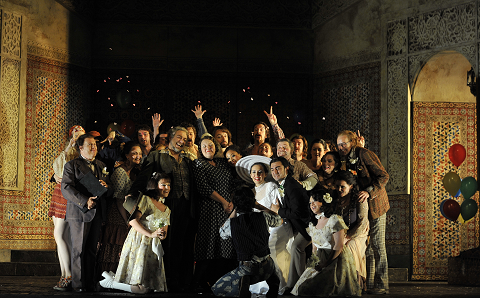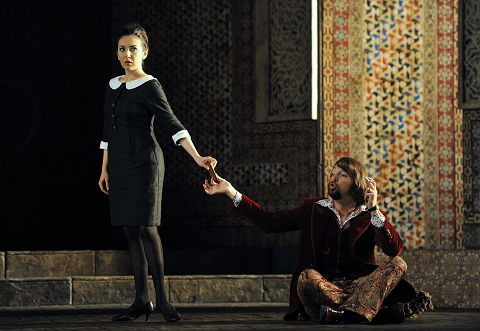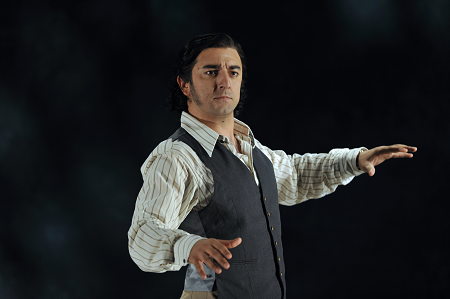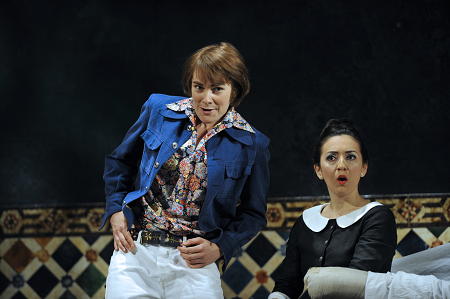
04 Jul 2016
Le nozze di Figaro, Glyndebourne
Michael Grandage's production of Mozart's Le nozze di Figaro, which was new in 2012, returned to Glyndebourne on 3 July 2016 revived by Ian Rutherford.
English Touring Opera are delighted to announce a season of lyric monodramas to tour nationally from October to December. The season features music for solo singer and piano by Argento, Britten, Tippett and Shostakovich with a bold and inventive approach to making opera during social distancing.
This tenth of ten Live from London concerts was in fact a recorded live performance from California. It was no less enjoyable for that, and it was also uplifting to learn that this wasn’t in fact the ‘last’ LfL event that we will be able to enjoy, courtesy of VOCES8 and their fellow vocal ensembles (more below …).
Ever since Wigmore Hall announced their superb series of autumn concerts, all streamed live and available free of charge, I’d been looking forward to this song recital by Ian Bostridge and Imogen Cooper.
The Sixteen continues its exploration of Henry Purcell’s Welcome Songs for Charles II. As with Robert King’s pioneering Purcell series begun over thirty years ago for Hyperion, Harry Christophers is recording two Welcome Songs per disc.
Although Stile Antico’s programme article for their Live from London recital introduced their selection from the many treasures of the English Renaissance in the context of the theological debates and upheavals of the Tudor and Elizabethan years, their performance was more evocative of private chamber music than of public liturgy.
In February this year, Albanian soprano Ermonela Jaho made a highly lauded debut recital at Wigmore Hall - a concert which both celebrated Opera Rara’s 50th anniversary and honoured the career of the Italian soprano Rosina Storchio (1872-1945), the star of verismo who created the title roles in Leoncavallo’s La bohème and Zazà, Mascagni’s Lodoletta and Puccini’s Madama Butterfly.
Evidently, face masks don’t stifle appreciative “Bravo!”s. And, reducing audience numbers doesn’t lower the volume of such acclamations. For, the audience at Wigmore Hall gave soprano Elizabeth Llewellyn and pianist Simon Lepper a greatly deserved warm reception and hearty response following this lunchtime recital of late-Romantic song.
Collapsology. Or, perhaps we should use the French word ‘Collapsologie’ because this is a transdisciplinary idea pretty much advocated by a series of French theorists - and apparently, mostly French theorists. It in essence focuses on the imminent collapse of modern society and all its layers - a series of escalating crises on a global scale: environmental, economic, geopolitical, governmental; the list is extensive.
For this week’s Live from London vocal recital we moved from the home of VOCES8, St Anne and St Agnes in the City of London, to Kings Place, where The Sixteen - who have been associate artists at the venue for some time - presented a programme of music and words bound together by the theme of ‘reflection’.
'Such is your divine Disposation that both you excellently understand, and royally entertaine the Exercise of Musicke.’
Amongst an avalanche of new Mahler recordings appearing at the moment (Das Lied von der Erde seems to be the most favoured, with three) this 1991 Mahler Second from the 2nd Kassel MahlerFest is one of the more interesting releases.
‘And there was war in heaven: Michael and his angels fought against the dragon; and the dragon fought and his angels, And prevailed not; neither was their place found any more in heaven … that old serpent … Satan, which deceiveth the whole world: he was cast out into the earth, and his angels were cast out with him.’
If there is one myth, it seems believed by some people today, that probably needs shattering it is that post-war recordings or performances of Wagner operas were always of exceptional quality. This 1949 Hamburg Tristan und Isolde is one of those recordings - though quite who is to blame for its many problems takes quite some unearthing.
There was never any doubt that the fifth of the twelve Met Stars Live in Concert broadcasts was going to be a palpably intense and vivid event, as well as a musically stunning and theatrically enervating experience.
‘Love’ was the theme for this Live from London performance by Apollo5. Given the complexity and diversity of that human emotion, and Apollo5’s reputation for versatility and diverse repertoire, ranging from Renaissance choral music to jazz, from contemporary classical works to popular song, it was no surprise that their programme spanned 500 years and several musical styles.
The Academy of St Martin in the Fields have titled their autumn series of eight concerts - which are taking place at 5pm and 7.30pm on two Saturdays each month at their home venue in Trafalgar Square, and being filmed for streaming the following Thursday - ‘re:connect’.
The London Symphony Orchestra opened their Autumn 2020 season with a homage to Oliver Knussen, who died at the age of 66 in July 2018. The programme traced a national musical lineage through the twentieth century, from Britten to Knussen, on to Mark-Anthony Turnage, and entwining the LSO and Rattle too.
With the Live from London digital vocal festival entering the second half of the series, the festival’s host, VOCES8, returned to their home at St Annes and St Agnes in the City of London to present a sequence of ‘Choral Dances’ - vocal music inspired by dance, embracing diverse genres from the Renaissance madrigal to swing jazz.
Just a few unison string wriggles from the opening of Mozart’s overture to Le nozze di Figaro are enough to make any opera-lover perch on the edge of their seat, in excited anticipation of the drama in music to come, so there could be no other curtain-raiser for this Gala Concert at the Royal Opera House, the latest instalment from ‘their House’ to ‘our houses’.
"Before the ending of the day, creator of all things, we pray that, with your accustomed mercy, you may watch over us."

Michael Grandage's production of Mozart's Le nozze di Figaro, which was new in 2012, returned to Glyndebourne on 3 July 2016 revived by Ian Rutherford.
Set in 1960's Seville, the production is designed by Christopher Oram with lighting by Paule Constable, and featured Gyula Orendt as Count Almaviva, Golda Schultz as Countess Almaviva, Davide Luciano as Figaro, Rosa Feola as Susanna, Natalia Kawalek as Cherubino, Carlo Lepore as Bartolo, Susan Bickley as Marcellina, John Graham-Hall as Don Basilio, Nicholas Folwell as Antonio, Alasdair Elliott as Don Curzio and Nikola Hillebrand as Barbarina. Jonathan Cohen conducted the Orchestra of the Age of Enlightenment.
In an article in the programme book Michael Grandage explained that the 1960's setting for the production came about partly because they were looking for a suitable milieu in which it would be possible for the Countess and Susanna to convincingly swap clothes. Peter Schlesinger's photographs of the beautiful people of the late 1960's provided the inspiration. Another given was the intention to have the action set just in the single day specified in the libretto, so Christopher Oram's designs pair a massive, ancient-looking Moorish palace on a revolve with 1960s people, the whole flowing beautifully from the opening when the Count and Countess arrive early morning during the overture, to the finale in the darkened garden.
I had seen the production when new, when it came to the BBC Proms and also caught it on television, but this was the first time that I had seen it at Glyndebourne. The advantage of the production is manifestly the great beauty of the sets, the lovely contrast between the Moorish-inspired architecture and the 1960s costumes, and the remarkably detailed personen-regie ensuring that the characters were both brilliantly realised and finely in period. And it was both very funny and rather touching.
 Le nozze di Figaro, Glyndebourne Festival 2016. Susanna (Rosa Feola) and Count Almaviva (Gyula Orendt). Photographer: Robbie Jack.
Le nozze di Figaro, Glyndebourne Festival 2016. Susanna (Rosa Feola) and Count Almaviva (Gyula Orendt). Photographer: Robbie Jack.
My biggest problem with the production remains the depiction of the Count (Gyula Orendt): a selfish playboy prone to bouts of jealousy, he just didn't seem to inspire the sort of fear that would seem to be needed to make the other characters' behaviour believable. A telling point at the performance was that when Orendt's Count went down on one knee at the end of Act Four to beg forgiveness of the Countess (Golda Schultz), there was a small but distinct titter from the audience. In 1960s guise, with his red velvet jackets and tendency to start jiving, this conception of the Count had too many funny moments.
But thinking about the production, as the performances from Davide Luciano as Figaro, and Rosa Feola as Susanna were so strong, it was as if Michael Grandage and Ian Rutherford were refocussing the dramaturgy slightly, making the servants the stronger, more dominant characters as the feckless aristocrats play on around them.
 Le nozze di Figaro, Glyndebourne Festival 2016. Figaro (Davide Luciano). Photographer: Robbie Jack.
Le nozze di Figaro, Glyndebourne Festival 2016. Figaro (Davide Luciano). Photographer: Robbie Jack.
It helped that both Luciano and Feola are native Italian speakers, so that the opening scene had great strength and vitality in their use of language. Luciano's strong, rather virile performance reminded me that in the original play Figaro had a number of Revolutionary sentiments (which were stripped out by librettist Lorenzo da Ponte). Here was a Figaro less the charmer and more the schemer, quick to jealousy and full of passion. Luciano's musical performance was to match, singing with a sense of a strong line and with a feeling of suppressed anger. Rosa Feola as Susanna was poised and elegant, again with an inner strength combined with suppleness of line. You felt that Feola could have easily taken on the role of the Countess, and her account of ‘Deh vieni’ gave us some of the finest singing of the evening.
Against this pair, the self-indulgent, rather feckless Almavivas did not stand a chance. Golda Schultz's Countess, floating around in her kaftans, was all elegant charm with no real core to her character. Schultz sang warmly vibrant voice, drawing on a lovely sense of elegant personality in the recitatives and beguiling as she should. But ‘Porgi amor’ seemed to lack a real sense of line and felt a little too much like a series of isolated, albeit beautiful, notes, though her account of ‘Dove sono’ had a touching melancholy about it. Gyula Orendt's Count was beautifully sung, within the confines of the character as conceived in this production. Orendt could spin a beautiful line, yet also be quick to anger and his pacing of the long comic scene which ends Act Two was simply brilliant.
Natalia Kawalek was a piece of relatively late casting as Cherubino. Kawalek made a wonderfully convincing youth, and her impulsively sulking performance really helped ground the drama in the naturalism which Grandage clearly desired. Musically she seemed to take some time to warm up, and ‘Non so piu’ seemed to lack the sort of relaxed refulgence of tone which is ideal in this role, though ‘Voi che sapete’ was sung with great charm.
 Le nozze di Figaro, Glyndebourne Festival 2016. Cherubino (Natalia Kawalek) and Susanna (Rosa Feola). Photographer: Robbie Jack.
Le nozze di Figaro, Glyndebourne Festival 2016. Cherubino (Natalia Kawalek) and Susanna (Rosa Feola). Photographer: Robbie Jack.
Carlo Lepore was a striking Don Bartolo, rather slickly untrustworthy yet touching when he discovers Figaro is his son. Susan Bickley made a delightful Marcellina, matronly but elegant and full of character, it was a shame that we did not get her aria. Neither did John Graham-Hall's oily Don Basilio get his aria, though Graham-Hall was a complete delight as this odious character. Nikola Hillebrand was a leggily elegant Barbarina, cavorting with Natalia Kawalek's Cherubino and singing her Act Four aria with poise.
The smaller roles were all strongly taken with Alasdair Elliott as Don Curzio, Nicholas Folwell as Antonio, and Julia Hamon and Alison Langer as the bridesmaids. Like the rest of the cast, the chorus clearly had great fun with the 1960s visual details of the production, and helped to bring the ensemble scenes alive. Though I have to confess that I found the choreography (originally by Ben Wright and revived by Kieran Sheehan) relied a little too much on fitting 1960s dance moves to period music, a trope that can easily weary.
From the opening notes of the overture, Jonathan Cohen and the Orchestra of the Age of Enlightenment gave us a crisply vivid account of the score. Cohen used the period instruments to keep the textures light, yet vivid, and to allow the music to move without seeming overly rushed. Individual numbers were shaped finely, but there was an over-arching sense to the performance too, matching Grandage's desire to have the action move seamlessly through the day. There was some lovely continuo playing from Ashok Gupta (forte piano) and Jonathan Manson (cello), responsive and imaginative without overly drawing attention to itself.
All concerned brought out that combination of pathos, humour and tragedy which is the work's hallmark, and if the great moments did not quite move us as much as they could, overall this was a vividly engaging production, with a cast of beautifully realised characters.
Robert Hugill
Mozart: Le nozze di Figaro
Figaro: David Luciano, Susanna: Rosa Feola, Count Almaviva: Gyula Orendt, Countess Almaviva: Golda Schultz, Cherubino: Natalia Kawalek; director: Michael Grandage, conductor: Jonathan Cohen, revival director: Ian Rutherford, designer: Christopher Oram, lighting: Paule Constable, Orchestra of the Age of Enlightenment.
3 July 2016, Glyndebourne Festival Opera